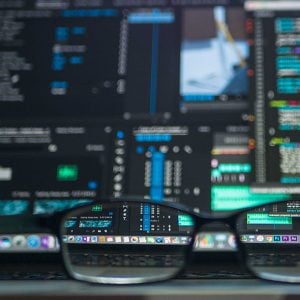There has been a lot of talk lately about the exposure of blue light. Research states that excessive exposure is the leading cause of vision loss for people over 50. Blue light is something we see on electronics, specifically cell phones and computers. Some artificial lights contain blue light as well that we see anywhere there is light that is not the outside. Blue light exposure can affect our sleep cycle and potentially cause diseases. When looking at our electronics in the dark, it throws off our biological clock, meaning it makes our brain think that we should still be awake, as if it were daytime. Hence why people will stay up all night playing video games on the TV and not feel tired.
 However, blue light is beneficial during the daytime as it boosts attention and mood and keeps us awake when we should be. Though, looking at a computer all day in the daytime can still cause eye strain. Eye strain refers to stinging of the eyes, irritation, burning, blurry vision, and itching. It can also cause headaches due to the eyes having to work harder. This is when protective eyewear comes in handy or minimizing glare. Glares on the wall and finished surfaces, and reflections on the computer screen can also cause computer eye strain. In the night, it is considered to be disruptive. Some studies suggest a link between exposure to blue light at night with cancer, diabetes, heart disease, and obesity. There is no true evidence that these are directly linked but blue light does interfere with the formation of melatonin which helps us fall asleep. The lower melatonin levels that this causes might be linked to cancer since those with cancer have these low levels. Due to the shift in the biological clock, blood sugar levels become increased which causes a prediabetic state.
However, blue light is beneficial during the daytime as it boosts attention and mood and keeps us awake when we should be. Though, looking at a computer all day in the daytime can still cause eye strain. Eye strain refers to stinging of the eyes, irritation, burning, blurry vision, and itching. It can also cause headaches due to the eyes having to work harder. This is when protective eyewear comes in handy or minimizing glare. Glares on the wall and finished surfaces, and reflections on the computer screen can also cause computer eye strain. In the night, it is considered to be disruptive. Some studies suggest a link between exposure to blue light at night with cancer, diabetes, heart disease, and obesity. There is no true evidence that these are directly linked but blue light does interfere with the formation of melatonin which helps us fall asleep. The lower melatonin levels that this causes might be linked to cancer since those with cancer have these low levels. Due to the shift in the biological clock, blood sugar levels become increased which causes a prediabetic state.
It is not just blue light that causes the melatonin to be suppressed, it is just that blue light is more powerful than other lights. To protect yourself from blue light at night, use dim red lights for night lights since red lights has the least amount of power to suppress melatonin levels. Avoid looking at bright screens two to three hours before bed, which includes laptops and cellphones. If there is a need to look at electronics at night, blue light filtered glasses can help. The blue light filter can also help with eye strains that occur from staring at a screen for hours as well.
Another way to prevent blue light filters is to adjust the color of the screen. Windows 10 specifically has a blue light mode where the screen is red to prevent the blue light exposure. Cellphones such as the iPhone, has developed a night time mode that dims the screen and provides a different color.
